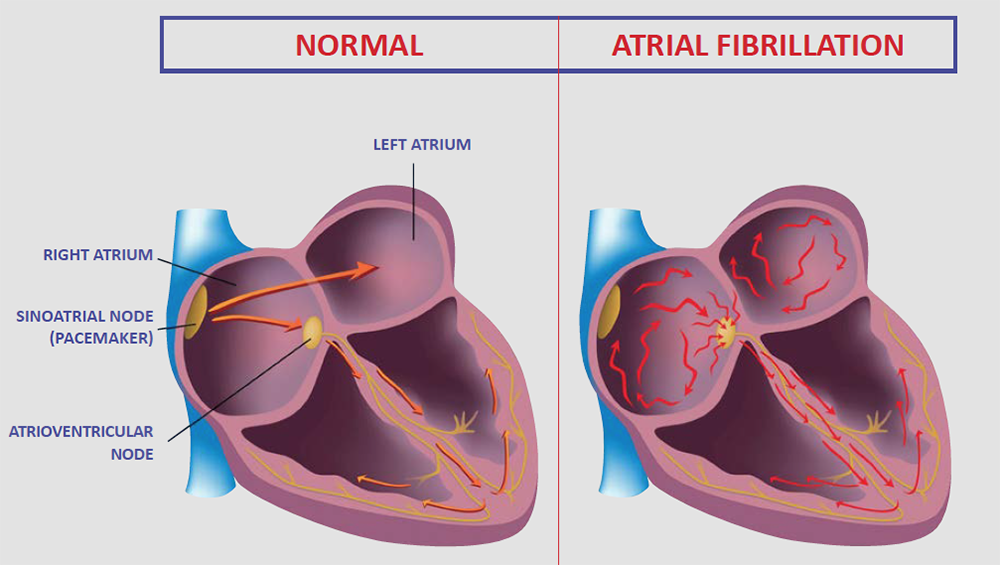$10 Million Endowment Goal Will Create Arrhythmia Research Center

This story was published in the September 2019 issue of The Philanthropist, a newsletter for supporters and friends of Northwestern University Feinberg School of Medicine and Northwestern Memorial Foundation. Read the whole issue here.
About 6 million people in the United States live with atrial fibrillation, the most common kind of cardiac arrhythmia. This complex condition involving irregular rhythm in the top chambers of the heart is responsible for nearly a quarter of all strokes, and it increases a person’s risk for heart failure, dementia and death. But the symptoms of atrial fibrillation are subtle, and many patients who have the condition don’t realize anything is wrong.
Now, support from numerous generous donors — including a landmark gift from an anonymous benefactor — will enable cardiac electrophysiologist Rod S. Passman, MD, MSCE, and a group of Northwestern Medicine physician-scientists to improve the way cardiologists diagnose and treat patients with heart rhythm disorders. Nearing a $10 million endowment goal that will create an Arrhythmia Research Center at Northwestern University Feinberg School of Medicine, the team plans to focus in part on leveraging technology to change outcomes for these patients.
“As long-time supporters of Northwestern Medicine, the Bluhm Family Charitable Foundation is pleased to support the Arrhythmia Research Center and its mission,” shared Caryn Skurnick, a member of the Bluhm family and a patient in Dr. Passman’s clinic. “I have gotten to know Dr. Passman well through the years and seen first-hand how he and his team are translating what they learn through their research to help patients like me. We all will benefit from their dedication, concern and compassion.”
Read about Dr. Passman’s investiture as the Jules J. Reingold Professor of Electrophysiology
Digital health has been a constant theme in Dr. Passman’s career. Years ago, he helped develop surgically implantable heart monitors to keep track of cardiac events that suggest arrhythmias over the long term. Today, as wearable technology provides an opportunity for less invasive and less expensive heart monitoring, Dr. Passman has partnered with Apple to find out if the company’s smartwatches could be an accurate tool for detecting and managing arrhythmias.

“We are in the midst of a new frontier in atrial fibrillation. Recent discoveries have made it clear we can dramatically improve the lives of our patients through ablation, wearable technology, cardiac imaging and new drugs and devices to reduce stroke risk. And we believe there are even more innovations to come,” Dr. Passman said. “Donor support will enable us to bring needed research to the next level, and all of the physicians and investigators involved in this important work at Northwestern are so grateful to every contributor that made the Arrhythmia Research Center possible.”
The initial funding for the new center, which will become part of the Feinberg Cardiovascular and Renal Research Institute, will support research projects, faculty recruitment and training opportunities for fellows.
Research will focus on further understanding the molecular mechanisms underlying atrial fibrillation, so investigators can develop new treatments that target those roots. Another major goal is to optimize drug therapies for maintaining normal heart rhythm and preventing stroke, so patients have limited exposure to side effects. Current guidelines recommend life-long treatment with anticoagulation drugs, even during long periods of a normal rhythm. Advances in wearable technology, for instance, might allow physicians to target anticoagulation only around the time of an episode.
“Our Arrhythmia Research Center will be among the first of its kind in the nation,” said Clyde W. Yancy, MD, MSc, chief of Cardiology and the Magerstadt Professor of Medicine. “I am confident it will become a platform for new discoveries.”
Bequest Supports Atrial Fibrillation Into the Future

On top of the $10 million endowment to establish the Arrhythmia Research Center, Irena Chen, a patient of Dr. Passman’s for the last decade, has made a significant bequest to support research in the center.
“As a patient who suffered for a long time with atrial fibrillation before being diagnosed, I know how important it is to detect this condition before it is too late,” Mrs. Chen shared. “Dr. Passman is not only a great researcher, but also an exceptionally caring doctor. I have a great appreciation for his research and his patient care — this is why I will contribute to his research any way I can.”
Originally from Austria and Czechoslovakia, Mrs. Chen worked for many years in Chicago’s healthcare sector, as an educational coordinator at the Advocate Christ Medical Center and, later, in the private practice of her husband, KC, a surgeon. The couple retired together in 2000.
For more information about the Arrhythmia Research Center, please contact Kathleen Praznowski at 312.503.0762 or kathleen.praznowski@northwestern.edu.